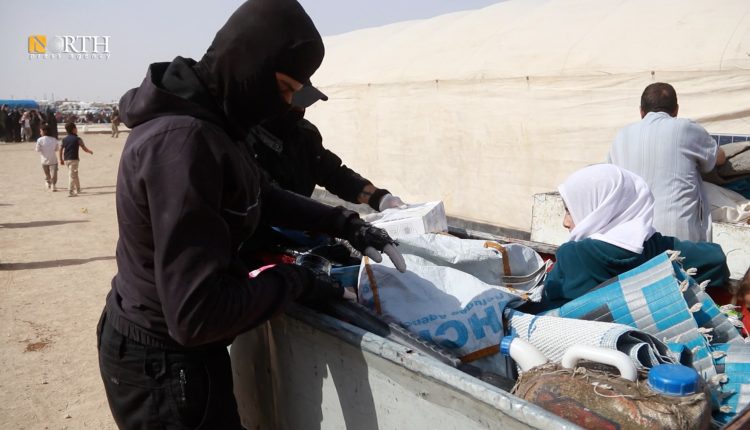Syria’s Kurdish Forces Arrests 20 ISIS Suspects During Security Sweep in Hawl Camp
By Kardo Roj
QAMISHLI, Syria (North Press) – In a targeted counterterrorism operation now in its fifth day, the Syrian Democratic Forces (SDF) have detained 20 individuals suspected of affiliation with Islamic State (ISIS) sleeper cells inside Hawl Camp, located in the countryside of Hasakah, northeast Syria. The operation, launched Friday by the Internal Security Forces (Asayish) with the support of Women’s Protection Units (YPJ) and backing from the US-led Global Coalition, aims to dismantle ISIS’s residual presence within the camp.
According to SDF spokesperson Abgar Dawood, the ongoing security sweep has already yielded tangible results. “Twenty suspects have been detained. After investigation, four were released while the rest remain in custody due to direct or indirect ties with ISIS,” Dawood told North Press on Tuesday.
The operation has also led to the discovery of hidden caches of weapons and ammunition within sections of the camp, which hosts tens of thousands of internally displaced persons and families of suspected ISIS fighters.
“These detainees were actively involved in financing operations, funneling money into the camp to facilitate escapes and procure weapons,” Dawood added. “Their arrest significantly weakens the logistical capabilities of the group.”
Camp Hawl, which once served as a temporary shelter during the height of the Syrian conflict, has increasingly become a hotbed for radicalized activity, particularly among individuals still loyal to ISIS’s ideology. Security experts have long warned that the camp functions as a de facto incubator for extremism, especially among children and women who remain under the ideological influence of the now-defunct caliphate.
Despite the territorial defeat of ISIS in 2019, security officials say the group has exploited the fragile political landscape in Syria to regroup and launch sporadic attacks. The volatility is further exacerbated by the absence of a unified international repatriation policy for foreign nationals residing in the camp, leaving many without legal resolution or rehabilitation pathways.
“The ongoing instability in various parts of Syria has created an environment where extremist cells can persist and, in some cases, expand,” Dawood explained. “This is why continuous operations like this are crucial for regional stability.”
Camp Hawl currently holds more than 30,000 residents, including over 10,000 foreign nationals. Previous attempts to secure the facility have faced logistical and political obstacles, often due to the sheer scale of the camp and the presence of high-risk individuals.
The latest sweep comes amid heightened international scrutiny over the management of such facilities and the potential security risks they pose. Western governments, including the United States and several European states, have expressed concern about the radicalization potential within the camp but have been slow to repatriate their citizens.
The SDF, operating under the umbrella of the Autonomous Administration of North and East Syria (AANES), has consistently emphasized the need for international collaboration in resolving the humanitarian and security challenges at Hawl. Recent coordination with the Global Coalition has enhanced intelligence-sharing and provided limited logistical support to security operations.
As the campaign in Hawl continues, observers suggest that long-term solutions must address both security enforcement and broader humanitarian conditions within the camp. Without such reforms, the potential for ISIS resurgence remains high.
“The SDF’s actions are essential for maintaining security not just within the camp, but across northeast Syria,” said a regional security analyst who requested anonymity. “However, these operations must be complemented by international commitment to repatriation and deradicalization programs.”
With the SDF and AANES taking a proactive approach to security governance, the latest developments in Hawl highlight both the persistent threat posed by ISIS remnants and the critical role of local forces in countering extremism across the region.

